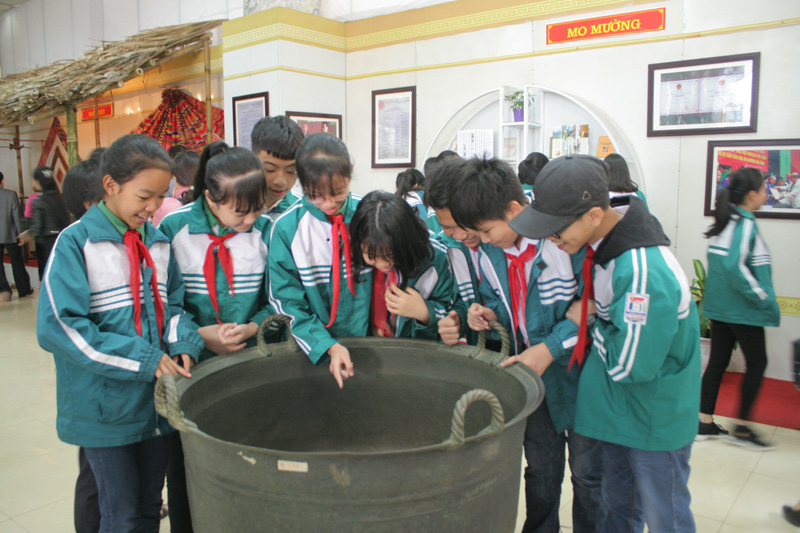
(HBO) – In the cultural heritage of Vietnamese people, the culture of Muong ethnic group is imprinted in various fields.
Students
come to study exhibits at the provincial museum under the theme "Typical
cultural heritage of Muong ethnic group in Hoa Binh province”.
On display are nearly 200 documents and objects reflecting some unique features
of Muong culture in Hoa Binh province. The most outstanding is the display area
of Muong ethnic group’s traditional brocade weaving. This craft has existed for
a long time. Girls from 9 to 10 years old know to follow their mothers to the
fields to grow and harvest cotton. When they are 13-14 years old, they learn to
practise spinning.
For the first time, Mo Muong cultural heritage has been shown to the public. Mo
Muong is a collection of mythological epics performed at the funeral of Muong
ethnic people. It reflects the spiritual life and the development history of
Muong ethnic group as well as their viewpoints on life and death, the eternal
existence of human souls, and desires for community cohesion, peace, and good
future.
Today, Mo Muong still exists and is constantly improved by many generations of
Mo prayers. The special value of Mo Muong has been included in the list of
national intangible cultural heritages by the Ministry of Culture, Sports and
Tourism.
Bui Thi Niem, Director of the provincial Department of Culture, Sports and
Tourism, said the cultural heritage of Muong ethnic people in Hoa Binh is
demonstrated in the architecture of stilt houses, costumes, gastronomy,
cultural and historical relic sites, and antiques such as bronze drums, gongs,
and pottery in Muong people’s graves as well as other fields like traditional
customs, festivals, rituals, music, and performing art.
Muong ethnic people in Hoa Binh are always proud to be the cradle of the "Hoa
Binh Culture” dating back to more than 20,000 years with the preservation of
hundreds of bronze drums and more than 5,000 precious gongs as well as numerous
festivals featuring the unique culture of the ancient Vietnamese./.
The clothing of women reflects the culture of the Muong, Thai, Tay, Dao, and Mong ethnic groups in the northern province of Hoa Binh.
Gongs hold a special place in the cultural and spiritual life of the Muong ethnic people in Hoa Binh province. More than musical instruments, they are an indispensable part of community rituals and collective memory, echoing through generations as a spiritual thread linking the past, present, and future.
Preserving and promoting the cultural values of the Muong ethnic group has become an urgent task in the current context, as many traditional values face the risk of fading away. This effort requires not only protecting the cultural identity but also eliminating outdated customs and developing a modern cultural lifestyle, contributing to sustainable values for the Muong community in Hoa Binh province.
The Muong ethnic culture, deeply rooted in Vietnam’s mountainous north, continues to be preserved and revitalised by dedicated individuals and communities determined to safeguard their ancestral identity.
The Muong group is one of the largest ethnic minorities in Vietnam, primarily found in Hoa Binh province. The Muong people in Hoa Binh boast a rich and diverse cultural treasure that reflects the unique identity of this ethnic group. Accounting for over 63% of the province's population, they have created and preserved numerous distinctive cultural values, contributing to their unique identity. Their cultural heritage is an invaluable asset, at the heart of their national identity, and represents a vibrant spiritual life that must be preserved and promoted in today’s modern world.
For generations, the ethnic communities of Hoa Binh province, particularly the Muong people, have preserved vibrant festivals deeply intertwined with the region’s geography, nature, and social traditions. These celebrations enrich Hoa Binh’s spiritual life and cultural identity, reflecting both folk beliefs and the intermingling of ethnic customs. Many of these festivals have endured the test of time, passed down through generations and continuing to thrive today. Among them, the Khai Ha (Going Down to the Field) festival stands out as one of the most significant events of the Muong ethnic group.



